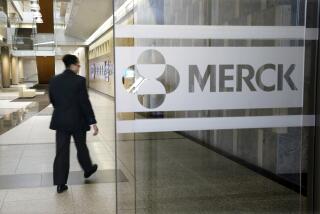Pfizer Defends Celebrex’s Safety
- Share via
Last week, Pfizer Inc. looked like the big winner after Merck & Co. announced that its pain reliever Vioxx was being pulled from the market because of increased risks for heart attacks and strokes.
On Thursday, that changed.
Pfizer, the world’s biggest drug maker, saw its shares fall as it defended its painkiller Celebrex one day after a report and an editorial released by the New England Journal of Medicine suggested that the medication might be linked to heart risks.
Celebrex is in the same class of drugs as Vioxx. A three-year Merck study showed that patients who took Vioxx for more than 18 months faced twice the risk of a heart attack compared with those taking a placebo. Merck lost $26.8 billion in market value after the announcement.
On Thursday, shares of Pfizer dropped $1.19 to $29.99 on the New York Stock Exchange after trading as low as $28.60. Merck shares declined 69 cents to $30.98 and are down 31% since Sept. 29. Other large drug makers felt the effects. Eli Lilly & Co. hit a 52-week low, falling $1.91 to $59.56 on the New York Stock Exchange. Schering-Plough Corp. dropped 55 cents to $17.98, and Wyeth declined 74 cents to $37.64, both on the NYSE.
Pfizer said Celebrex was safe.
“There’s an accumulation of cardiovascular data that proves that we’re different,” said Joseph Feczko, president of worldwide development for New York-based Pfizer.
Celebrex had sales of $1.5 billion in the first six months of this year. It is Pfizer’s fifth-largest seller. The company’s Bextra painkiller also is in the same category of drugs.
In the New England Journal of Medicine report, Garret A. FitzGerald, chairman of the department of pharmacology at the University of Pennsylvania, says studies have suggested that medications such as Celebrex and Vioxx that treat pain by inhibiting an enzyme known as Cox-2 may also cause heart problems.
“What we really need right now is for [the Food and Drug Administration] to look at all of the data and make a statement,” FitzGerald said Thursday.
After the Merck announcement, new prescriptions and refills for Celebrex and Bextra jumped 78% from Sept. 30 through Oct. 2, according to Atlanta-based NDCHealth Corp., a provider of information services to the health industry.
In the journal’s editorial, Dr. Eric Topol of the Cleveland Clinic accuses Merck of irresponsibly promoting Vioxx after clinical trials in 2000 first pointed to its risk of causing heart attacks. He also said U.S. regulators had failed to protect the public.
Topol, in the editorial and in subsequent interviews, pointed to a study in 2000 in which Vioxx was shown to quadruple the risk of heart attack in a Merck trial of 8,000 arthritis patients. Data from that trial were unveiled only months after Vioxx was launched. He also questioned the safety of Celebrex and Bextra.
Late Thursday, Sen. Charles E. Grassley (R-Iowa) accused the FDA of trying to slow the publication of research from one of its own scientists highlighting heart risks for Vioxx. Grassley, chairman of the Senate Finance Committee, has been investigating how the agency monitors the safety of approved drugs.
*
Associated Press, Bloomberg News and Reuters were used in compiling this report.
More to Read
Inside the business of entertainment
The Wide Shot brings you news, analysis and insights on everything from streaming wars to production — and what it all means for the future.
You may occasionally receive promotional content from the Los Angeles Times.










